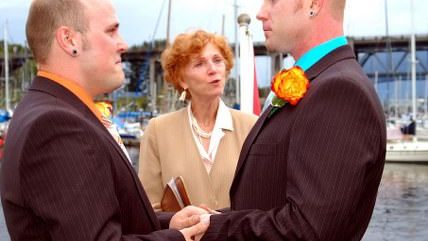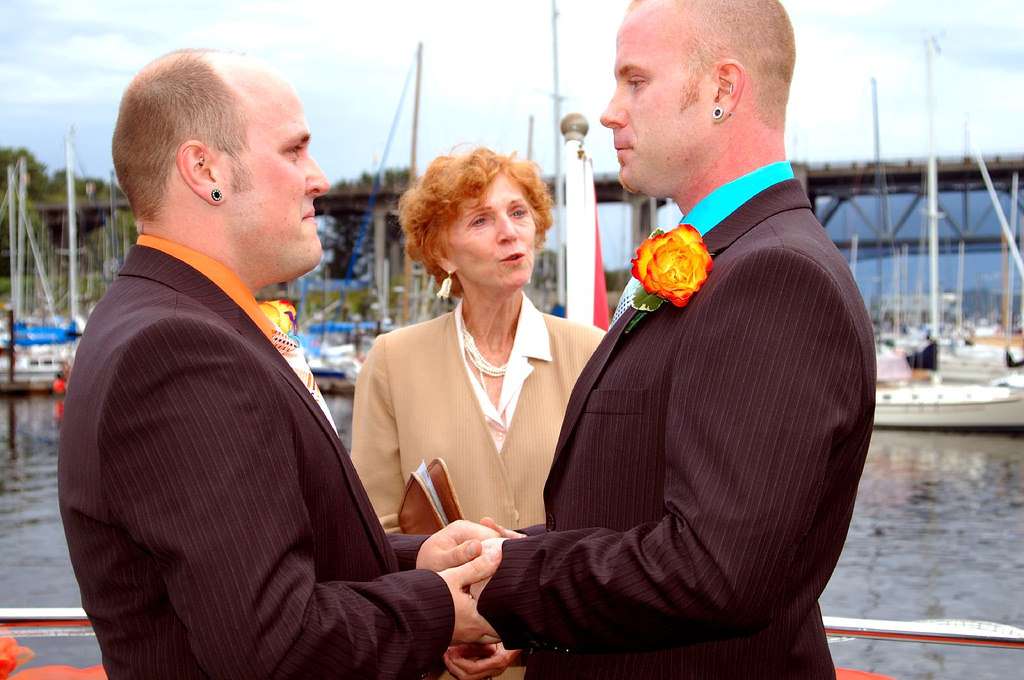Gay Marriage Recognition Bans Upheld in Four States. Are We SCOTUS-Bound Now?


As some court watchers (including our own Damon Root) predicted, the U.S. Court of Appeals for the 6th Circuit has put the brakes on the mass march of same-sex couples to their local city clerk's office to pick up marriage licenses. By a ruling of 2-1, the court has reversed lower court rulings and upheld gay marriage recognition bans in Michigan, Ohio, Kentucky, and Tennessee.
The majority conclusion isn't so much about the validity of bans of gay marriage as about who controls the process by which they are or are not recognized. As Root previously suggested, it is a deferential decision. From the ruling (pdf):
This case ultimately presents two ways to think about change. One is whether the Supreme Court will constitutionalize a new definition of marriage to meet new policy views about the issue. The other is whether the Court will begin to undertake a different form of change—change in the way we as a country optimize the handling of efforts to address requests for new civil liberties.
If the Court takes the first approach, it may resolve the issue for good and give the plaintiffs and many others relief. But we will never know what might have been. If the Court takes the second approach, is it not possible that the traditional arbiters of change—the people— will meet today's challenge admirably and settle the issue in a productive way? In just eleven years, nineteen States and a conspicuous District, accounting for nearly forty-five percent of the population, have exercised their sovereign powers to expand a definition of marriage that until recently was universally followed going back to the earliest days of human history. That is a difficult timeline to criticize as unworthy of further debate and voting. When the courts do not let the people resolve new social issues like this one, they perpetuate the idea that the heroes in these change events are judges and lawyers. Better in this instance, we think, to allow change through the customary political processes, in which the people, gay and straight alike, become the heroes of their own stories by meeting each other not as adversaries in a court system but as fellow citizens seeking to resolve a new social issue in a fair-minded way.
That reference to the "heroes being judges and lawyers" sounds like a not-so-subtle shot at guys like Ted Olson and David Boies, who have certainly pursued lots of positive press for their role in fighting Proposition 8 in California, as well as judges who have made sure to have some nice quotable lines in their rulings striking down marriage recognition bans.
We now have split decisions, with the 6th Circuit decision running counter to several other circuit decisions. This will increase the likelihood that the Supreme Court will take up the issue. They had previously declined, but previously all the appeals courts were in agreement.
Editor's Note: As of February 29, 2024, commenting privileges on reason.com posts are limited to Reason Plus subscribers. Past commenters are grandfathered in for a temporary period. Subscribe here to preserve your ability to comment. Your Reason Plus subscription also gives you an ad-free version of reason.com, along with full access to the digital edition and archives of Reason magazine. We request that comments be civil and on-topic. We do not moderate or assume any responsibility for comments, which are owned by the readers who post them. Comments do not represent the views of reason.com or Reason Foundation. We reserve the right to delete any comment and ban commenters for any reason at any time. Comments may only be edited within 5 minutes of posting. Report abuses.
Please to post comments


Think of the poor SC justices...they had wanted the lower courts to implement SSM, keeping their fingerprints off it. Now they have to choose between upholding the rule of law and pleasing their cocktail-circuit friends.
Of course, judicial activism can go both ways. Logically, the constitutional case for *banning* SSM is as plausible - and just as implausible - as the case for *requiring* it. A right-wing activist court could say that, traditional marriage being fundamental to republican government, neither SSM nor no-fault divorce can be allowed.
"Banning" = denying recognition 🙂
No GKC, the pendulum only swings one way. Next you will telling me about rule about first you later me or something.
John, I got to an earlier thread about the election in VA late, but I wanted to tell you that you're exactly right about socons, social liberals, millenials etc.
Thank you.
Now they have to choose between upholding the rule of law and pleasing their cocktail-circuit friends.
No they don't. They can just implement the 14A = equal protection.
This doesn't make sense as written. If you the case for SSM is so strong that it represents a "challenge" that the citzenry must "meet" in "admirable" fasion, what's the arguement for the court not to act? "Yes, your rights are being violated, but I think we should just wait and see if the people doing so get tired someday and stop all on their own" isn't an argument we'd accept in response to, say, a ban on firearm ownership. Why here?
It makes perfect sense, provided you understand that the Constitution doesn't protect everything you like or prohibit every bad or even immoral policy.
If it's not a constitutional matter, then he shouldn't, in his official capacity, be opinining about whether or not the citiznery is admirable or not.
Why not? All he saying is that if this is a good law go out and convince people rather than expecting the courts to shove it down people's throats.
Because it's not his job to judge whether laws are good or not.
The nazgul give opinions about whether the law is a good idea or not all the time. "It's not the Supreme Courts job to protect voters from their bad decisions".
"In just eleven years, nineteen States and a conspicuous District, accounting for nearly forty-five percent of the population, have exercised their sovereign powers to expand a definition of marriage that until recently was universally followed going back to the earliest days of human history".
So we let a re-writing of Webster's re-write law?
That one guy could do better.
So, the Warty-Sugarfree shindig is off?
Gay marriage is an oxymoron. Marriage laws are totally irrelevant to same-sex couplings. If people have a right to marry those of the same gender, then they also logically have a right to marry all manner of things - their pets, a group - can be mixed gender, whatever. Since the Constitution says absolutely nothing about marriage, it cannot provide a definition of same. As the courts said today, it should be decided by the people, not the courts. That means Federalism - the states decide, as they are the location of marriage laws in the first place. There is no national marriage law, so there can't be a national definition of marriage. The state marriage laws themselves could be subject to challenges on the basis of providing unfair tax advanatges, etc.
Why is government involved in marriage to begin with? Isn't it wrong to afford additional benefits to people because of their personal relationship to another person?
This.
I really don't understand why there are federal benefits for being married nor having children. Maybe I'm ignorant...but it doesn't make logical sense to me. But I'm pretty anti-religion (not that being religious would make me any more logical, haha)
Marriage has been around a long, long time. Coming to this epiphany now is quite poor timing.
Coming to this epiphany now is quite poor timing.
Making that assumption is quite idiotic. But then you're nothing if not consistent.
A speed bump to marriage equality in all 50 states.
Can't wait until I can get that $12,500 standard deduction as a single tax filer and take advantage of that $500,000 with my business partner.
Oh, wait. You weren't really talking about "equality" were you?
*$500,000 property sale cap
And BACK INTO THE CLOSET with all of yas